
|
![]()
Greatest Films of the 1990s
1990 | 1991 | 1992 | 1993 | 1994 | 1995 | 1996 | 1997 | 1998 | 1999
Title Screen Film Genre(s), Title, Year, (Country), Length, Director, Description 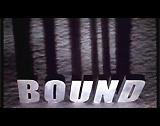



Bound (1996), 108 minutes, D: Andy and Larry Wachowski
The Wachowski brothers' debut film was a clever, erotic crime-thriller and stylishly sexy, neo-noir gangster film. It was advertised as the first mainstream Hollywood film with a prominent lesbian relationship (in a bisexual love triangle) between a scheming pair of femme fatales - the film's main characters. Two leading actresses portrayed the scheming pair of females who experienced a believable, titillating, Sapphic sexual liaison: Corky (Gina Gershon), a tattooed, butch, hard-body lesbian and ex-con, and Violet (Jennifer Tilly), a breathy, high-pitched, baby-voiced closeted bisexual. For the previous five years, Violet was the sultry, pampered, smart but "kept woman" and trophy wife of her white, Italian mafioso boyfriend, wise-guy mobster Caesar (Joe Pantoliano), a middle-man and money-launderer. While Corky was renovating their next-door apartment, the two fell in love - and then plotted to make their lives better. In the story, the mobster family's "money-man" Sheldon "Shelly" (Barry Kivel) had been accused of embezzlement - skimming $2 million dollars. After being tortured to reveal the money's location, Shelly was impulsively killed by Caesar's rival "family" mobster - the hotheaded Johnnie Marzzone (Christopher Meloni), the son of Mafia boss "Gino" Marzzone (Richard C. Sarafian). The blood-splattered money was brought by Caesar back to his apartment to literally be "laundered" so it could be delivered to Johnnie and Gino the next evening. The violent ordeal had prompted Violet to confide in Corky that she had made a life-altering decision to get out of the family permanently. They would now have the opportunity to rip off the cash before the delivery deadline. Their present-day detailed planning was cleverly cross-cut with a non-linear, visual montage of future events. The two schemed to steal the money before the pickup of the money case in the apartment (Corky: "I've an idea how to make this work"). It was risky, but Corky took the money next door and hid it, while replacing the money in Caesar's case with paperweight newspapers. Caesar was (falsely) told by Violet that she had seen Johnnie leaving the apartment - after he had presumably snuck in and taken the money. It was her ploy to encourage Caesar to fear that he would be blamed, and to cause him to run - thereby proving his guilt and suffering mob recrimination. Things went awry when Caesar didn't follow what they predicted would happen. The pickup of the money by the Marzzones was also a disaster - it ended with three dead bodies - Caesar killed Johnnie, Johnnie's Mafia boss father, and a bodyguard. Caesar's next move was to attempt to get the money back, and to fool other mob associates, including Caesar's superior Mickey "Mick" Malnato (John P. Ryan) into thinking that the group "never showed up" for some unknown reason. Meanwhile, Corky had hidden the cash in cans of white paint in the next-door apartment. Ultimately, Caesar figured out that Violet and Corky were in cahoots (and in love behind his back) and had betrayed him and stolen and hidden the money. During a tense concluding showdown between Violet and Caesar, Caesar dared her to shoot - and she did. He died as blood from his wounds splattered onto the white paint on the floor, and created blotchy red patches on his white shirt. In the epilogue, Violet and Corky were in the clear when Mickey believed her fabricated story that Caesar had fled. In the film's happy-ending conclusion, Corky and Violet made their liberating getaway in her brand-new red 1990 Chevrolet pickup truck; Corky asked: "You know what the difference is between me and you, Violet?"; when Violet responded: "No," Corky answered: "Me neither"; the two donned sunglasses before Corky drove off with their hands clapsed together - capped with a final kiss.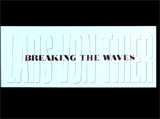



Breaking the Waves (1996, Den./Swed./Neth./Fr./Norway), 159 minutes, D: Lars von Trier
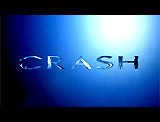


Crash (1996), 98 minutes, D: David Cronenberg




The English Patient (1996), 162 minutes, D: Anthony Minghella
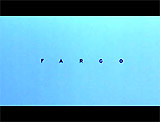



Fargo (1996), 97 minutes, D: Joel Coen
An offbeat, clever, kidnap whodunit-caper and black comedy, a tale of greed and crime, involving a financially-stricken Midwestern car salesman Jerry Lundegaard (William H. Macy) who ineptly schemes to kidnap his own wife Jean (Kristin Rudrid). When his hired henchmen Carl and Gaear (Steve Buscemi and Peter Stormare) botch the kidnapping, their murderous plan is persistently investigated by Marge Gunderson (Frances McDormand), the pregnant police chief of Brainerd, Minnesota.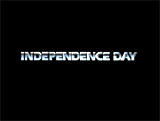


Independence Day (1996), 135 minutes, D: Roland Emmerich
In this jingoistic disaster film, a major hit that grossed more than $817 million (worldwide), mysterious alien invaders threatened to destroy Earth's major cities. Plans to protect and defend the US are set in motion by hotshot pilot Captain Steven Hiller (Will Smith), computer hacker/technician David Levinson (Jeff Goldblum), and the President of the US Thomas J. Whitmore (Bill Pullman) - on, of course, July 4th, Independence Day. A sequel is due in 2016.



Jerry Maguire (1996), 138 minutes, D: Cameron Crowe




Lone Star (1996), 130 minutes, D: John Sayles
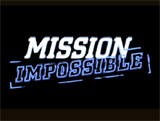


Mission: Impossible (1996), 110 minutes, D: Brian De Palma
See Mission: Impossible series.



Mulholland Falls (1996), 107 minutes, D: Lee Tamahori
Director Lee Tamahori's self-conscious, flashy neo-noir crime thriller and nostalgic detective murder-mystery drama, his first Hollywood film, was clearly modeled after the quintessential neo-noir film Chinatown (1974). It followed the exploits of a special and elite group ("hat squad") of four ruthless, unorthodox, crime-fighting and chain-smoking LAPD detectives, sartorially decked out with dapper suits and wide-brimmed fedoras. The justice meted out by the rogue group against gang members in LA was often harsh and beyond legal means: ("Four men, no politics, no favors. We answered to nobody"), and condoned by LA's Chief of Police. The themes of the entangled plot of the film included moral corruption, deceit and cover-up, the pursuit of truth leading to personal demons and ruin, illicit films and sexual liaisons, blackmail, and a conspiracy of powerful US military-government officials regarding a desert military base hiding atomic testing secrets. The body count ended up being 6.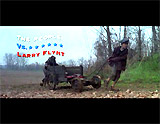


The People vs. Larry Flynt (1996), 129 minutes, D: Milos Forman
This biographical drama was about the outspoken, unlikely First-Amendment free-speech advocate and publisher of X-rated Hustler magazine, Larry Flynt (Woody Harrelson). It began with a short prologue set in the early 1950s in Kentucky, where young Flynt (Cody Block) was engaged in moonshining. Then, the film jumped ahead 20 years, finding Flynt and his younger brother Jimmy (Brett Harrelson) running a strip club in Cincinnati. In 1974, Flynt created the sleazy porno Hustler magazine (originally the strip club's illustrated newsletter beginning in 1972), and met his future wife Althea Leasure (pop singer Courtney Love), one of his underage, bisexual erotic dancers known as "Calamity Jane." One of his biggest coups was in 1975 - the publication of paparrazi photographs taken of a naked Jacqueline Kennedy Onassis, leading to the sale of 2 million copies of Hustler, and causing crusades against him led by Charles Keating (James Cromwell), the head of Citizens for Decent Literature. The unorthodox businessman Flynt was faced with anti-pornography and obscenity lawsuits, and was briefly put in prison in the mid-1970s for smut-peddling. Flynt married Althea in 1976 - a notorious open marriage that allowed for promiscuity, and she co-published Hustler with him (she served as its first life-sized centerfold). In 1977, Flynt was temporarily converted to Christianity by Ruth Carter Stapleton (Donna Hanover), sister of President Carter. In 1978 while he was in Georgia, he and his lawyer Alan Isaacman (Edward Norton) were shot by an unknown sniper. Flynt was paralyzed from the waist down, and wheelchair-bound forever. Upon moving to Bel-Air, California with his wife, the couple became drug-addicted to his pain-killers and morphine. Rejuvenated by 1983 after innovative surgery that removed his pain (and his addiction), Flynt was again facing more legal battles - charges of leaking FBI surveillance videos related to the John DeLorean entrapment case, and he served six months for contempt of court. Also, he was back in court in 1983, sued for $40 million for an infamous commercial ad parody that satirized fundamentalist preacher Rev. Jerry Falwell (Richard Paul), the 'moral majority' leader, performing unnatural sex acts with his mother in an outhouse. Eventually, Althea fell victim to AIDS (diagnosed in 1983) and died in 1987 after years of sexual promiscuity. During some of his courtroom trials, Flynt mocked the judicial process with colorful, theatrical, outrageous contempt-of-court antics - he disrespectfully wore an American flag-diaper and a safari helmet, and T-shirts with curse words, and was ultimately charged with desecrating the flag. At one point, Flynt was sent to a psychiatric ward where he was diagnosed as bipolar. Regarding the 1984 defamation case with Falwell, Flynt countersued the preacher for copyright infringement. Flynt was found guilty of inflicting 'emotional distress' - but not libel. Flynt pursued an appeal of the Falwell decision to the US Supreme Court - his beleaguered lawyer Isaacman at first refused before accepting. The case, Hustler Magazine v. Falwell, was brought to the high court in 1987 and successfully argued. The court's verdict overturned the original verdict in a unanimous decision that protected the right of free speech.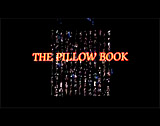


The Pillow Book (1996 Fr./UK/Netherlands), 126 minutes, D: Peter Greenaway
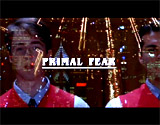




Primal Fear (1996), 129 minutes, D: Gregory Hoblit
In this dramatic mystery legal-thriller, ambitious, slick high-profile Chicago defense lawyer Martin Vail (Richard Gere) was hired (pro bono) to defend stuttering Kentucky altar boy Aaron Stampler (Edward Norton in his film debut) who was accused of viciously murdering Chicago's Archbishop Richard Rushman (Stanley Anderson) in his residence. Stampler was originally a homeless street kid that was taken in by the priest. The Archbishop was later revealed to be involved in sexual abuse and corruption of altar boys, including Stampler (a clear motive for revenge and murder). Early on, Vail witnessed how Stampler suffered from multiple personality disorder, confirmed by psychiatrist Molly Arrington (Frances McDormand). Stampler had two distinct personalities: a psychotic, violent, sociopathic, and dominant aggressive alter-ego named Roy, and a normal rational self named Aaron (who couldn't remember anything about Roy). It was a seemingly impossible case to win, since the evidence incriminated Stampler, and an insanity plea was not possible. The District Attorney was John Shaughnessy (John Mahoney), while the Assistant District Attorney prosecutor was Janet Venable (Laura Linney), Vail's ex-girlfriend, and the judge was Shoat (Alfre Woodard). During one intense cross-examination in the trial, violent 'Roy' erupted from Aaron's personality and attacked Venable. Eventually, Vail was able to clear his client with the Judge's ruling of mental insanity, and Stampler was ordered to a maximum security mental hospital. The shocking twist of the film was revealed after the trial's conclusion. As Aaron congratulated his lawyer in his cell, he apologized with a stutter for injuring Venable's neck ("Will you t-tell Miss Venable I'm sorry? Tell her I hope her neck is OK"). It suddenly dawned on Vail that Aaron was uncharacteristically remembering what Roy had done, rather than blacking out. Aaron had unwittingly revealed that he was only pretending to be insane and had actually premeditatively murdered the priest ("...cuttin' up that son of a bitch Rushman? That was just a f--kin' work of art!") and his own teenaged girlfriend Linda (Azalea Davila) ("That cunt just got what she deserved"), whom the Archbishop had molested. Also, he admitted that Roy was his real personality (and in charge) and that "there never was an Aaron either, counselor." As Vail left the cell and courtroom, disgraced, devastated and disgusted, he heard 'Roy's' closing words to him: "We did it, man. We f--kin' did it. We're a great team, you and me. You think I could've done this without you? You're just feelin' a little anger here because you started to care about old Aaron, I can understand that, but - you know, love hurts, Marty."


Scream (1996), 111 minutes, D: Wes Craven
Wes Craven's surprising, rejuvenating horror hit-spoof self-reflectively paid tribute to various stalker/slasher films, beginning with the character of a long-faced killer named Ghostface costumed for Halloween as a death-masked Grim Reaper. The elaborate and satirical, self-aware script (by Kevin Williamson) deliberately referenced numerous classic horror movies (with trivia, quotes, cliches, and "rules"). The surprising horror hit-spoof was a half-parody and half-tribute film (with nods to Hitchcock and other prominent horror films) that gave rise to three sequels (through 2011). It opened with a sudden, unexpected, murderous stalking and ultra-sadistic demise of a very familiar movie actress - Drew Barrymore as a hapless teen victim, after she failed to correctly answer a trivia question about Friday the 13th (1980). Craven's film noted the truth about most scary movies: "What's the point? They're all the same. Some stupid killer stalking some big-breasted girl who can't act who is always running up the stairs when she should be going out the front door. It's insulting." But then, he deftly and effectively inserted the genre's common plot devices into the mayhem to further his own ends - to celebrate the slasher film. Notice cameos from Linda Blair (The Exorcist) and from Craven himself as janitor Fred (Krueger) - and two telling quotes about how real life can imitate art: "It's all one great big movie…only you can't pick your genre," and "Don't you blame the movies! Movies don't create psychos! Movies make psychos more creative!" In the unmasking during the bloodbath Grand Guignol finale, the vengeful perpetrators (two movie-obsessed assailants) were discovered to be disgruntled teens finding retribution for adultery and the breakup of a family.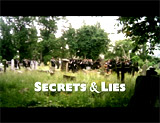


Secrets & Lies (1996, UK/Fr.), 142 minutes, D: Mike Leigh




Trainspotting (1996, UK), 90 minutes, D: Danny Boyle
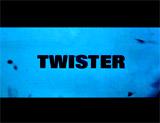


Twister (1996), 117 minutes, D: Jan de Bont